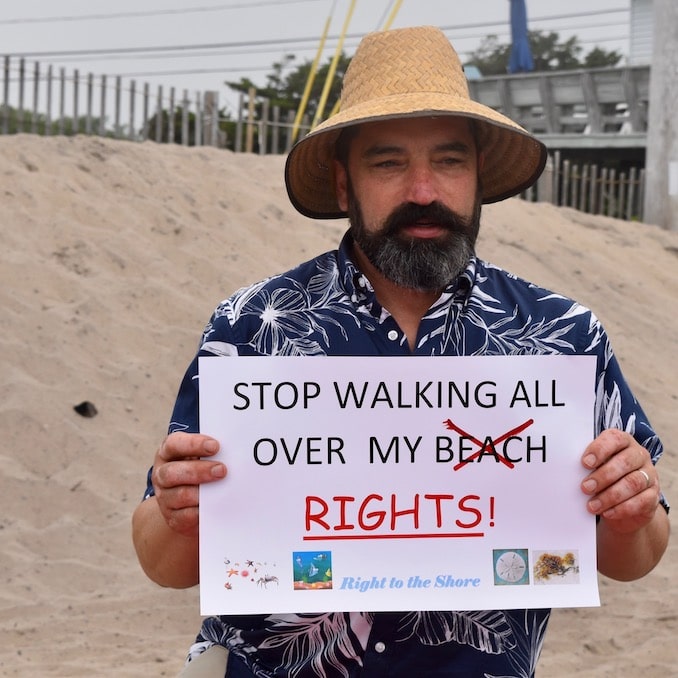Protesters
fight for our constitutional right to access ‘privileges of the shore’
 “Lines are
being drawn by the very few who can afford to decide where the lines go,” said Scott
Kealey.
“Lines are
being drawn by the very few who can afford to decide where the lines go,” said Scott
Kealey.
“Lines are
being drawn straight through your Rhode Island constitutional rights to the
shoreline. So we’re here to draw the line. We’re here to enjoy our rights of
the Rhode Island shoreline, even if someone has decided that sitting equals
trespassing.”
Last month, Scott Keeley was arrested by
the South Kingstown Police for
willful trespass after picking up seaweed on a private beach.
Though the charges were dismissed, and the police, according to Keeley, apologized, Keeley organized a protest Saturday morning to fight for Rhode Island’s constitutional right to access the beach.
Though the charges were dismissed, and the police, according to Keeley, apologized, Keeley organized a protest Saturday morning to fight for Rhode Island’s constitutional right to access the beach.
Over 150 people attended.
To watch this video on YouTube: https://www.youtube.com/watch?v=SzbvRJSEzf8
The protesters met on Charlestown Town Beach, and then deliberately walked east onto the nearby private beaches just over the line, in South Kingstown.
They brought ten foot long cords and
ribbons with them, to measure ten feet out from the “wet,” that is, ten feet
beyond where the high tide reaches. This, claim the protesters, is their right
under the Rhode Island State Constitution.
Article 17, spells out in sometimes
specific, sometimes difficult to interpret detail, the public’s right to access
the shoreline:
“The people shall continue to enjoy and freely exercise all the rights of fishery, and the privileges of the shore, to which they have been heretofore entitled under the charter and usages of this state, including but not limited to fishing from the shore, the gathering of seaweed, leaving the shore to swim in the sea and passage along the shore; and they shall be secure in their rights to the use and enjoyment of the natural resources of the state with due regard for the preservation of their values…”
In Article 16, the Constitution
notes that these rights are to be “liberally construed” and “shall not be
deemed to be a public use of private property.”
But where does that line, between
the public’s right to the shore, and the private property owner’s right to
exclude people from their property, actually reside?
“The ocean has now come forward, and
that’s part of the problem,” said James
Bedell of RISAC (Rhode
Island Shoreline Access Coalition). “In 40 years none of
these houses are going to be here. None of them. The beach is going to be over
there someplace, and we want our rights to travel with the wet/dry line.”
Climate change is rapidly changing
the shorelines in Rhode Island. A legal ruling from 1982 defined the area of
constitutional access to be “mean high tide,” that is, “the average area where
the tide reaches at its highest point at any given time a year.”
What does that mean in the age of
climate change and rising sea levels?
“God bless if you can go to the end
point to where the average mean high tide line is over 18.6 years,” said
Representative Blake Filippi (Republican,
District 36, Charlestown, New Shoreham, South Kingstown, Westerly) as quoted in the Independent.
To clarify the law, Keeley is
pushing for a new statute from the Rhode
Island General Assembly that would clarify that people have a
Constitutional right of access to the beach ten feet from the wet-dry line.
Ten feet is the average width of an
ox cart, what the framers of the Rhode Island Constitution may have had in mind
when they said that people could access the beach to collect seaweed for
fertilizer. Keeley said that Filippi will be introducing the legislation to the
General Assembly in January.
EDITOR’S NOTE: Prospects for this commonsense
legislation are dimmed not only by Filippi’s inability to get bills passed
because he is House Minority Leader, but also because Filippi has had his own
issues involving beach access.
In 2015, Filippi got into a fight with the
Block Island Rescue service and the Block Island Land Trust when he
and his brother blocked a public path to the beach that ran next to one of
his hotels. When the Filippis refused to re-open the path, the issue was
resolved when the Land Trust cut an alternative public pathway. – Will Collette
“Everyone here represents the
majority,” said Regina DeAngelo,
the first speaker at the rally.
“The vast majority is in agreement
with us. The minority, the very, very small minority, is trying to take away
our access. Whether you live in Rhode Island, Connecticut, Massachusetts New
York, or anywhere in the United States, if you want to enjoy the beach, you
must act to defend this right.”
To watch this video on YouTube: https://www.youtube.com/watch?v=i3jf8pQBoAo
“This has been an issue that’s been simmering in Rhode Island for decades and not getting the treatment that it really should,” said James Bedell.
“Remember: it’s the high tide plus
10. It’s not owning someone’s property or being able to use an extended beach
in front of property. We have a limited access, down the shore, to exercise our
constitutional activities.”
“I’m not the only one who’s paid
attention to these shoreline rights but I was arrested for exercising them,”
said Scott Keeley.
“The people of Rhode Island are not angry because I was arrested. The people of Rhode Island are angry because on June 9th at 1:00 o’clock we watched our rights taken away and they have not as yet been given back.”
“The people of Rhode Island are not angry because I was arrested. The people of Rhode Island are angry because on June 9th at 1:00 o’clock we watched our rights taken away and they have not as yet been given back.”